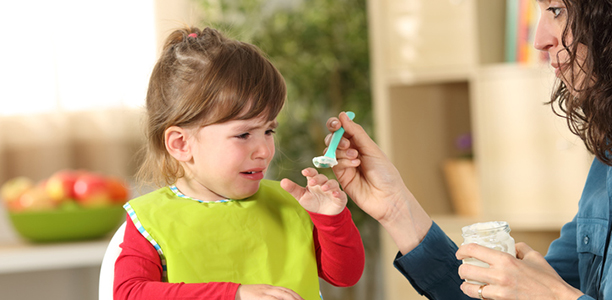
An analysis of the worries of parents driven to desperation over their child’s ‘fussy’ eating who called the Child Health Line has revealed many parents view child feeding time as a battleground.
Holly Harris conducted one of the first studies of parents’ thoughts and actions ‘at the point of crisis’ as part of her PhD research into ‘fussy eating’ at QUT’s School of Exercise and Nutrition.
The study was published in Public Health Nutrition.
“I studied real-time descriptions of young children’s fussy eating at a time of crisis that initiated the parents’ calls for help,” said Ms Harris who conducted the analysis of eating behaviours of children aged from six months to four years.
“I found parents felt their child’s mealtimes were a battle of wills, certainly a conflict zone, in which they viewed their child’s growing autonomy in choosing the amount and/or type of foods eaten as ‘bad’ or ‘wrong’.
“This study identified the importance of education and emotional support for parents across the period of introducing solids.”
Ms Harris said parents’ fussy eating concerns were different depending on the child’s age.
“In the infant group of children under 12 months, the main concerns were the child’s refusal of solid or textured food,” she said.
“Parents framed the problem positively such as the child was having trouble adjusting to solid food, or negatively that the child was ‘whingeing’, and sought strategies from the nurse call-taker.
“Parents of toddlers, on the other hand, were worried about the quantity and variety of foods their child ate and took the view that the child’s eating preferences were their responsibility.
“Some expressed guilt about giving in to their child with what they viewed as unhealthy food just so they had ‘eaten something’.”
Ms Harris said worry was driving parents’ to use counter-productive feeding practices.
“If a child is pressured to eat ‘just one more bite of broccoli’ or rewarded for eating food it teaches them to eat for reasons other than appetite and to gravitate towards ‘reward’ food that is high in fat and sugar.
Ms Harris said strategies to introduce new foods and avoid making mealtimes a conflict zone include:
- Providing a variety of food but allow the child to choose the amount they eat
- Repeating exposure to a new food over several days with a neutral face – it might take a few tries
- Not showing stress or giving in with unhealthy food if the child refuses the food or spits it out
- Parents can eat their meal in the presence of the child and not focus on what the child eats.
(Source: QUT, Public Health Nutrition)









